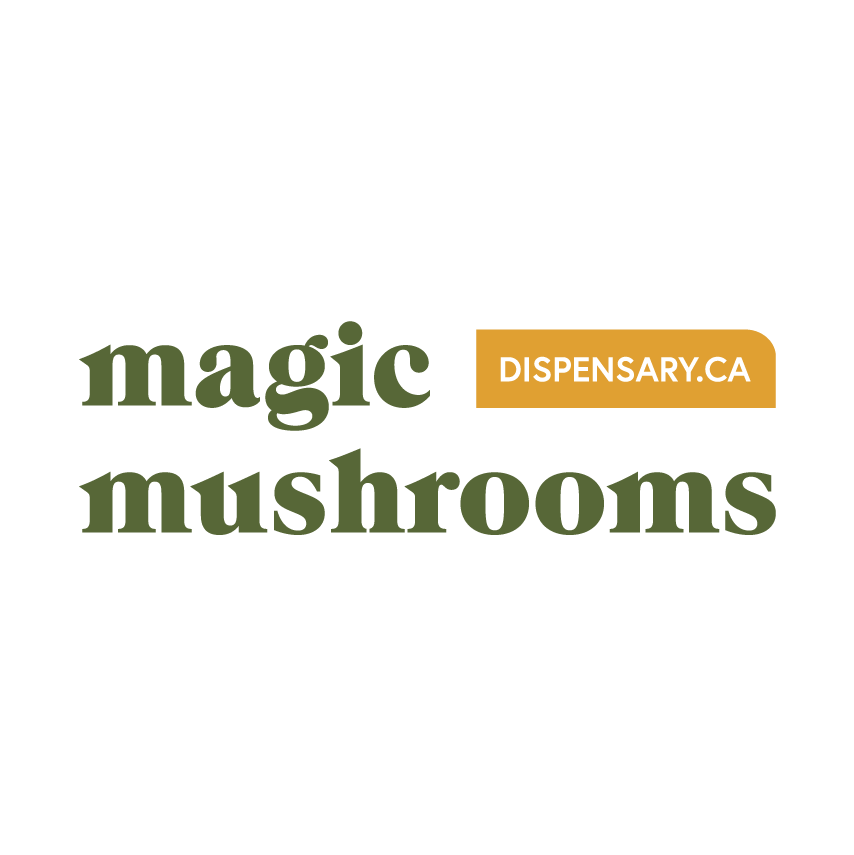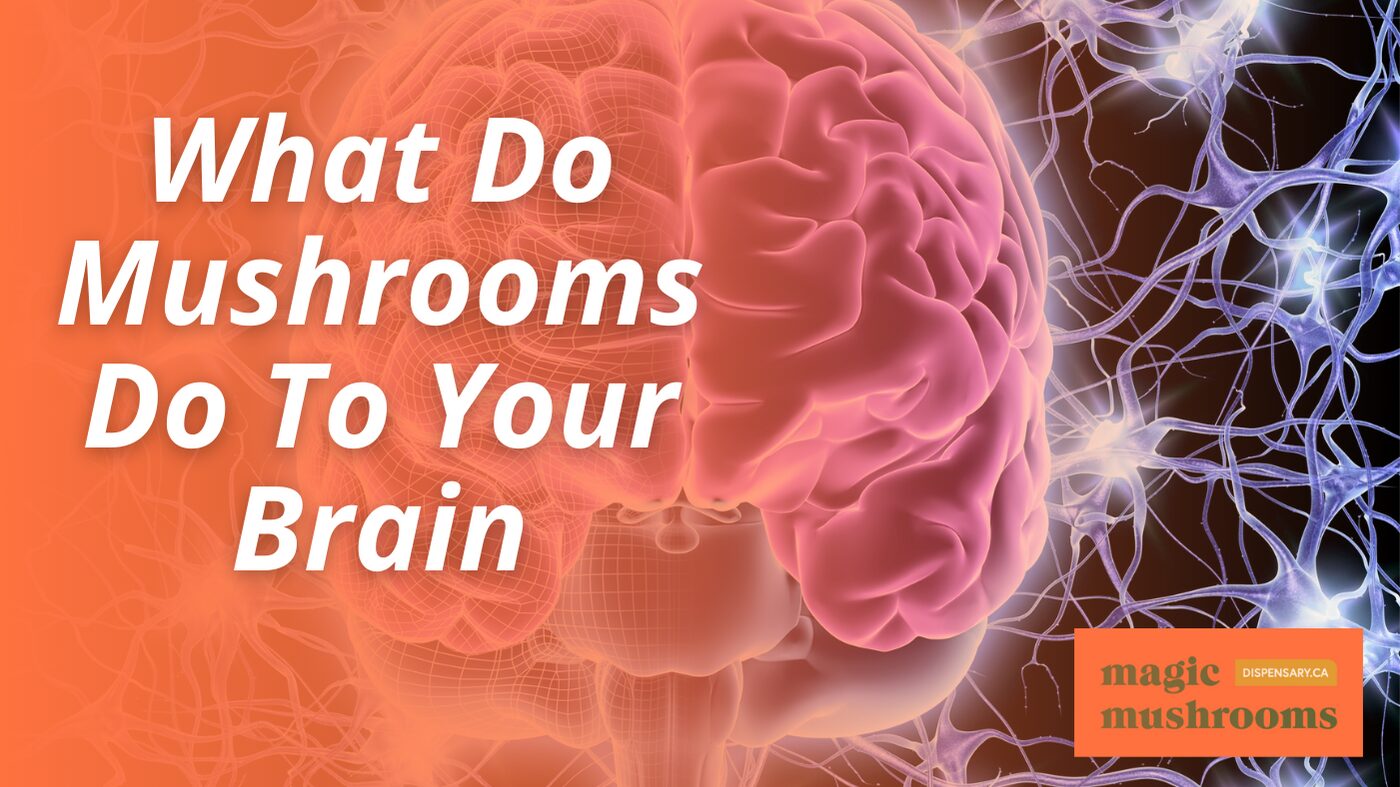In conversations about the effects of mushrooms on the brain, it’s crucial to recognize that these fungi are rich in psilocybin, a substance that drastically changes how the brain connects and operates, affecting thought processes and sensory perception. This substance engages with the brain’s serotonin receptors to provoke distinct sensory experiences and changes in awareness. Users often experience intense visual hallucinations and shifts in their emotional state as direct consequences.
If you’re asking, “What do mushrooms do to your brain?” in the long run, it’s essential to note that they may foster brain plasticity, potentially sparking enduring changes in brain function and mood. The impact on individual responses and sleep patterns varies from person to person. A more in-depth examination of the topic reveals the intriguing potential of these substances for therapeutic applications.
Key Takeaways
- Psilocybin, the active compound in psychedelic mushrooms, binds to serotonin receptors in the brain, altering perception and cognition.
- Psilocybin stimulates neuroplasticity and neurogenesis, potentially leading to long-lasting changes in brain function.
- Mushroom-induced hallucinations can include visual distortions, changes in time perception, and altered emotional states.
- Short-term effects of psilocybin include changes in thinking and emotional responses, with effects typically peaking within 2 hours.
- Long-term effects can include enduring changes in brain function, personality traits, and emotional states, suggesting therapeutic potential.
Understanding Psychedelic Mushrooms
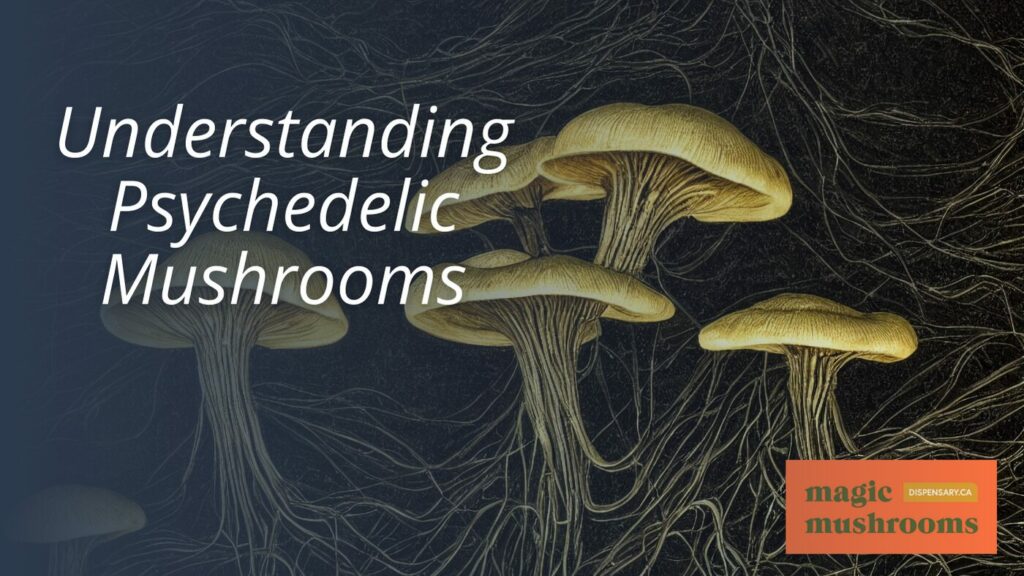
Delving into the world of psychedelic mushrooms, it’s essential to note that these fungi contain psilocybin, a compound currently under extensive research for potential therapeutic applications in mental health conditions such as depression, anxiety, and post-traumatic stress disorder (PTSD). Understanding the effects of shrooms on the brain is paramount, as this knowledge can liberate us from misconceptions and fear.
Diving into the question of how mushrooms affect the brain, research indicates that psilocybin may alter brain connectivity, increasing communication between different brain regions and leading to altered perception and thinking. This shift in neural communication can trigger profound changes in consciousness, mood, and thought patterns, offering a unique window into the workings of the human mind.
By exploring what shrooms do to your brain, one discovers that this substance might influence your emotional response. Mainly, it decreases negative feelings and enhances positive emotions. It is also suggested that magic mushrooms can affect the amygdala and prefrontal cortex, areas of the brain associated with emotions and decision-making, respectively.
Addressing how shrooms affect the brain, it’s worth mentioning that the effects typically last 4-6 hours, peaking within the first two hours. The duration and intensity of these effects can vary based on dosage and individual factors. The impact of psychedelic mushrooms on sleep patterns is noticeable, sometimes leading to vivid dreams or nightmares.
Thus, understanding what mushrooms do to your brain can be enlightening, shedding light on the potential therapeutic benefits and risks associated with their use. This knowledge can empower us to make informed decisions and contribute to destigmatizing these powerful natural substances.
The Main Active Ingredient: Psilocybin
Psilocybin, the primary active compound in psychedelic mushrooms, is responsible for the significant mind-altering effects associated with their consumption. This compound binds to serotonin receptors in the brain, leading to unique sensory experiences and shifts in consciousness often described as your brain on mushrooms.
The profound effects psilocybin has on your brain can induce what some refer to as mystical-type experiences. These experiences can alter the communication pathways between different brain regions, leading to changes in perception and mood and enhanced brain connectivity. The intensity and duration of these effects, typically lasting 4-6 hours with peak effects felt within 2 hours, can vary based on individual response and dosage.
Asking, “How do mushrooms affect your brain?” leads us to a fascinating scientific discovery. The transformative effects of psilocybin can be viewed as a form of liberation, a release from habitual patterns of thought and perception. This liberation can potentially open up new avenues for mental health treatment, with research suggesting that psilocybin may have therapeutic potential for conditions like depression, anxiety, and PTSD.
How Psilocybin Affects the Brain
To better understand the profound alterations in consciousness brought on by mushrooms, we must examine the specific ways in which psilocybin interacts with our brain. The active compound, psilocybin, binds to particular receptors in the brain, significantly affecting our mood, perception, and cognition.
The influence of psilocybin extends further, altering brain connectivity and increasing communication between different brain regions. This enhanced interconnectivity can modify our perception, thinking, and consciousness, creating a profound shift in our understanding of the world around us.
Psilocybin’s impact on the brain also promotes neuroplasticity, the brain’s ability to reorganize itself by forming new neural connections. This potential to catalyze long-lasting changes in brain function opens up a promising avenue for therapeutic benefits. Studies have shown that psilocybin can lead to decreased adverse and increased positive effects, suggesting a potential role for these compounds in mood modulation.
However, it’s important to note that research in this area is ongoing. While initial findings are promising, the long-term effects of psilocybin on the brain and its potential benefits for mental health conditions are yet to be fully understood. As we continue to explore the impact of psilocybin on the brain, we move closer to liberating its potential for therapeutic use and better understanding the complex interplay between this compound and our intricate neural networks.
The Role of Serotonin
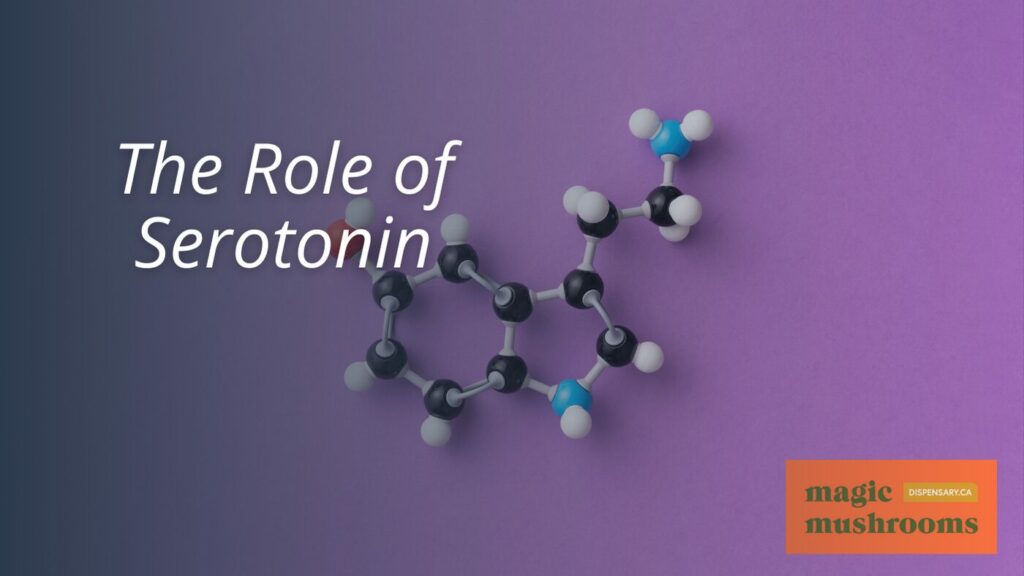
Understanding the role of serotonin in the brain provides critical insight into the effects of psilocybin. This active compound in psychedelic mushrooms binds to serotonin receptors, directly influencing mood, perception, and cognition. Serotonin, a neurotransmitter, is central to many brain functions, and its receptors are prime targets for psilocybin.
Upon ingestion, psilocybin is converted into psilocin, which then binds to serotonin receptors, specifically the 5-HT2A receptor. This binding stimulates a cascade of neurochemical events, culminating in altered brain connectivity. The mushroom compound’s ability to unlock this receptor leads to a cross-communication between brain regions that typically do not interact.
This increased dialogue in the brain can result in changes in perception and cognition, giving rise to the unique psychedelic experience. Moreover, these changes are not just transient but can have long-lasting effects. Research indicates that a single dose of psilocybin can lead to enduring changes in personality traits, such as increased openness and reduced neuroticism.
Interestingly, psilocybin does more than bind to serotonin receptors. It also promotes neuroplasticity, the brain’s ability to form new neural connections, potentially reshaping how we think and perceive the world. This property, together with its influence on emotional states, suggests a potential therapeutic role for psilocybin, especially for mental health conditions marked by rigid thought patterns or negative mood states.
Mushroom Induced Hallucinations
Mushroom-induced hallucinations, primarily resulting from the compound psilocybin’s impact on serotonin receptors, lead to significant alterations in perception and sensory experiences. Vivid visual distortions, auditory hallucinations, and changes in the perception of time and space often characterize these intense experiences. The sensual world becomes more vibrant, perceived through a kaleidoscope of heightened sensations and profound emotions.
The magic mushrooms exert their psychedelic effects through a temporary disruption of our usual brain activities. This disruption leads to an altered state of consciousness, where introspective thoughts, feelings of universal interconnectedness, and ego dissolution can occur. These experiences vary significantly in intensity and duration from person to person, but they are often described as mystical, transformative, and profoundly insightful.
Moreover, the brain’s emotional responses are significantly modulated during these hallucinatory states, with users frequently reporting a reduction in negative emotions and an increase in positive affect. This dramatic shift in mood, coupled with the unique perceptual changes, has sparked interest in the therapeutic potential of psilocybin, particularly in treating mood disorders and existential distress.
Changes in Perception: Why?
Psilocybin, the psychoactive compound in magic mushrooms, profoundly alters perception by binding to serotonin receptors in the brain. This action triggers a cascade of events that enhance communication between various brain regions, resulting in altered perceptions and thinking. This enhanced interconnectivity allows for a broader range of mental states, potentially leading to mystical-type experiences and shifts in consciousness.
The effects of psilocybin are not limited to the duration of the mushroom’s physical influence. The compound’s impact extends beyond the immediate sensory distortions, persisting even after the drug is metabolized. This is particularly noteworthy, suggesting that psilocybin could induce long-term perceptual changes.
These profound changes in perception are associated with the functional reorganization within the brain. Specific areas like the amygdala, prefrontal cortex, and decision-making circuits are particularly impacted. The reduced negative affect elevated positive feelings, and altered responses to emotional stimuli after psilocybin administration indicate a potential therapeutic role for magic mushrooms in modulating emotional states and brain activities.
Long-Term Effects on the Brain
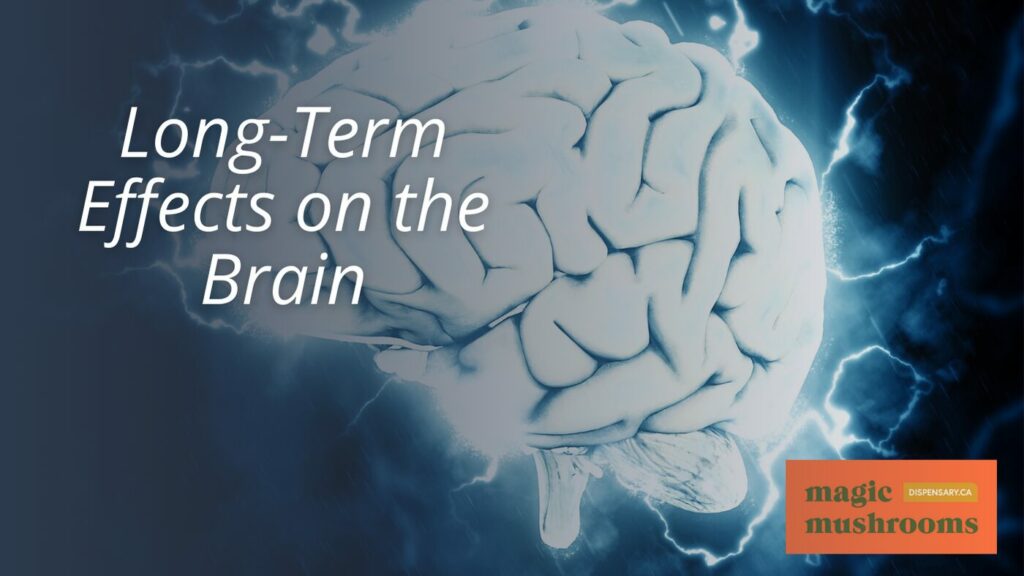
While the immediate perceptual distortions induced by psilocybin are intriguing, the long-term effects of psychedelic mushrooms on the brain warrant equally comprehensive exploration. The active compound in these mushrooms, psilocybin, has been shown to have significant and enduring impacts on brain function and emotional states.
Psilocybin binds to serotonin receptors, altering the brain’s connectivity and fostering increased communication between different regions. This binding is not fleeting; rather, the alterations in thinking and perception induced by psilocybin can incite long-lasting changes in how the brain operates.
Crucially, psychedelic mushrooms appear to unlock the brain’s potential for neuroplasticity—the ability to form new circuits and pathways. These neuroplastic effects are most notable in areas such as the amygdala, the prefrontal cortex, and decision-making circuits. The changes in these areas may account for the reported reduction of adverse and increased positive effects following psilocybin administration.
While the physical effects of psychedelic mushrooms may subside within hours, the psychological effects can extend far beyond the initial experience. These lasting reductions in negative mood and clinical symptoms suggest a possible therapeutic role for these compounds.
Indeed, while the understanding of the precise long-term effects of psychedelic mushrooms on the brain is still a work in progress, the existing research opens exciting avenues for potential therapeutic applications. For those seeking liberation from restrictive thought patterns or emotional states, the enduring effects of psilocybin present a beacon of hope.
Short-Term Effects on the Brain
The short-term effects of psilocybin mushrooms on the brain, typically lasting between 4-6 hours with peak effects felt within 2 hours of ingestion, present a fascinating alteration in perception, thinking, and brain connectivity. Psilocybin, the active compound in these mushrooms, binds to serotonin receptors in the brain. This binding alters the standard brain network patterns, leading to a disruption in connectivity and an increase in communication between different regions. This disruption results in the altered perception and thinking that is often associated with the consumption of these mushrooms.
The impact of psilocybin mushrooms on the brain extends to our emotional responses as well. Research shows that the consumption of these mushrooms can lead to a reduction in negative emotions, an increase in positive emotions, and altered responses to emotional stimuli. The changes in emotional responses are potentially linked to the changes in brain plasticity and connectivity due to psilocybin consumption. The brain areas particularly affected by these changes include the amygdala, the prefrontal cortex, and the circuits involved in decision-making.
While the physical effects of psilocybin mushrooms typically wane after a few hours, the psychological effects can persist. These lingering effects can lead to neuroplasticity and long-lasting changes in brain function. Additionally, the short-term effects of these mushrooms on the brain can vary based on factors such as dosage and individual characteristics, with some users reporting impacts such as altered sleep patterns and vivid dreams.
The Sensory Overload Phenomenon
Immersing one in a whirl of heightened senses and altered perceptions, the sensory overload phenomenon is a standout effect of psilocybin mushrooms on the brain. This dynamic shift in sensory perception is mainly due to the active compound psilocybin, which alters brain connectivity and amplifies communication between various brain regions. The result? A sensory blitzkrieg that can radically transform perception, thinking, and sensory experiences.
The sensory overload typically reaches its zenith within two hours of ingestion, a crescendo of sensory stimulation that can persist even after the physical effects have diminished. This surge of sensory input can often lead to vivid experiences and intense emotions, drastically changing one’s perception of reality. This is not limited to the physical senses but also includes a distorted sense of time and space, often described as dilated or condensed.
Furthermore, these altered brain dynamics can contribute to the sensory overload phenomenon, leading to potentially profound insights and life-altering experiences. The mushroom-induced sensory overload opens pathways to uncharted territories of the mind, paving the way for novel perspectives and revelations.
This intensification of sensory experiences is a testament to the power of psilocybin mushrooms. The sensory overload phenomenon proves that these natural substances can unlock new dimensions of perception, offering a unique opportunity for those seeking liberation from the ordinary. However, the intensity and unpredictability of these experiences call for careful navigation and responsible use, underscoring the importance of understanding the effects of mushrooms on the brain.
The Concept of Ego Dissolution
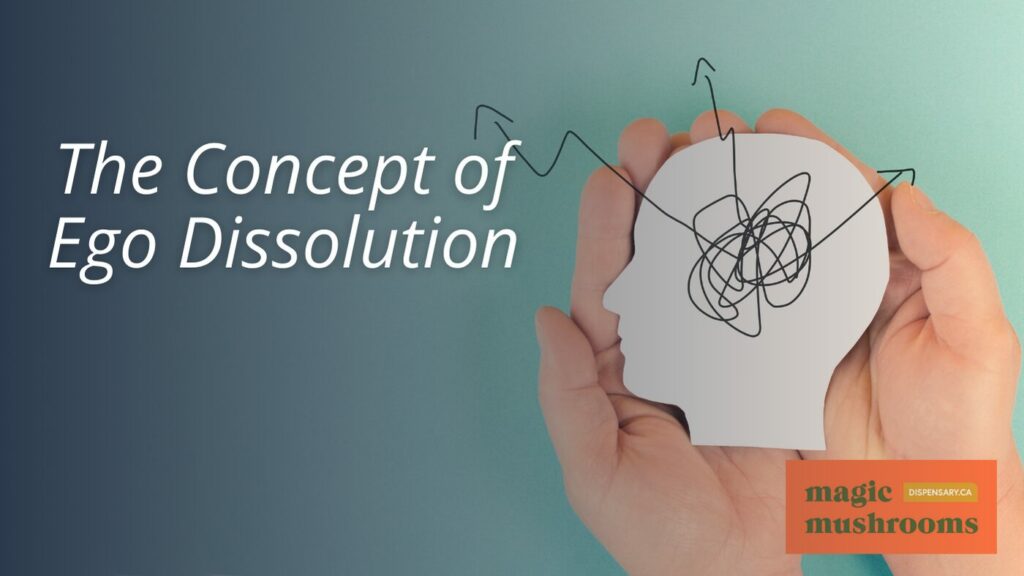
In the realm of psychedelic experiences, ego dissolution emerges as a profound phenomenon facilitated by psilocybin, marked by a temporary disruption or loss of one’s self-identity. This process of ego dissolution is distinctly characterized by a sense of unity and interconnectedness with the world, often leading to a deep, reflective state.
Ego dissolution occurs due to the disruption of regular brain activity by psilocybin, the psychoactive compound found in magic mushrooms. The individual undergoing this experience might experience a profound shift in perspective, leading to the dissolution of ego boundaries and promoting an enhanced sense of empathy and self-reflection. This state of consciousness fosters a unique understanding of one’s identity and place within the universe, providing an avenue of potential liberation from the constraints of the self.
Recent research has begun to highlight the potential therapeutic benefits of ego dissolution induced by psychedelic experiences. Reductions in negative mood and clinical symptoms following psilocybin usage suggest that these compounds might hold the key to modulating emotional states and brain activity. The temporary disruption of self-identity and the unification with the environment may provide a therapeutic avenue for those suffering from various mental health conditions, offering a novel perspective on personal identity and self-worth.
Neurogenesis and Brain Plasticity
Harnessing the potential of psilocybin, magic mushrooms may stimulate neurogenesis and enhance brain plasticity, thereby transforming our understanding of mental health treatment strategies. The active compound in these fungi, psilocybin, has been linked to the growth of new brain cells in regions critical for mood regulation and learning. This process, known as neurogenesis, may help individuals suffering from mood disorders to break free from entrenched negative thought patterns.
Moreover, research indicates that mushrooms can enhance brain plasticity, which is the brain’s ability to form and reorganize synaptic connections, especially in response to learning or experience. This heightened flexibility may allow for the establishment of new, positive cognitive pathways, ultimately contributing to improved mental wellbeing. Such mushroom-induced neuroplasticity could be instrumental in liberating individuals from rigid thought processes.
Furthermore, psilocybin’s effects on the brain extend to modulating emotional states. Studies have shown reduced negative effects and increased positive effects following psilocybin administration. These changes in emotional responses can be attributed to altered brain activity within critical areas, such as the amygdala and prefrontal cortex.
However, it’s important to note that the impacts of mushrooms on brain plasticity and neurogenesis are still under scientific scrutiny. As research continues, we can expect to gain deeper insights into the potential of mushrooms in treating various mental health disorders. This exploration promises to revolutionize our understanding of mental health and provide new avenues for liberation from mental health conditions.
Psilocybin and Mental Health
Exploring the potential of psilocybin in mental health treatment, researchers are discovering promising results in conditions such as depression, anxiety, and PTSD. Psilocybin, the active compound in psychedelic mushrooms, is showing potential in modulating brain activity and emotional states. This is due to its ability to alter brain connectivity and increase communication between different brain regions.
Research findings suggest that the administration of psilocybin can reduce negative affect and increase positive affect. This is particularly significant for those with therapy-resistant mental health disorders. These profound effects are thought to be linked to changes in brain plasticity and connectivity, with key areas such as the amygdala, prefrontal cortex, and decision-making circuits being particularly impacted.
Psilocybin’s role in inducing mystical-type experiences is also being studied for its therapeutic benefits. Interestingly, its psychological effects can persist even after the physical effects have waned. Typically, the effects of psilocybin last for about 4-6 hours, with peak effects being felt within the first two hours of consumption.
The emerging research on psilocybin and mental health provides hope for the development of novel treatment modalities. It is a testament to the power of nature and the unexplored potential of substances like psilocybin. However, it is crucial to note that these studies are conducted in controlled settings. Self-medication with psychedelic mushrooms can be dangerous and is not recommended. The full therapeutic potential of psilocybin is still being explored, with ongoing research for safety and efficacy.
Potential Therapeutic Uses of Mushrooms
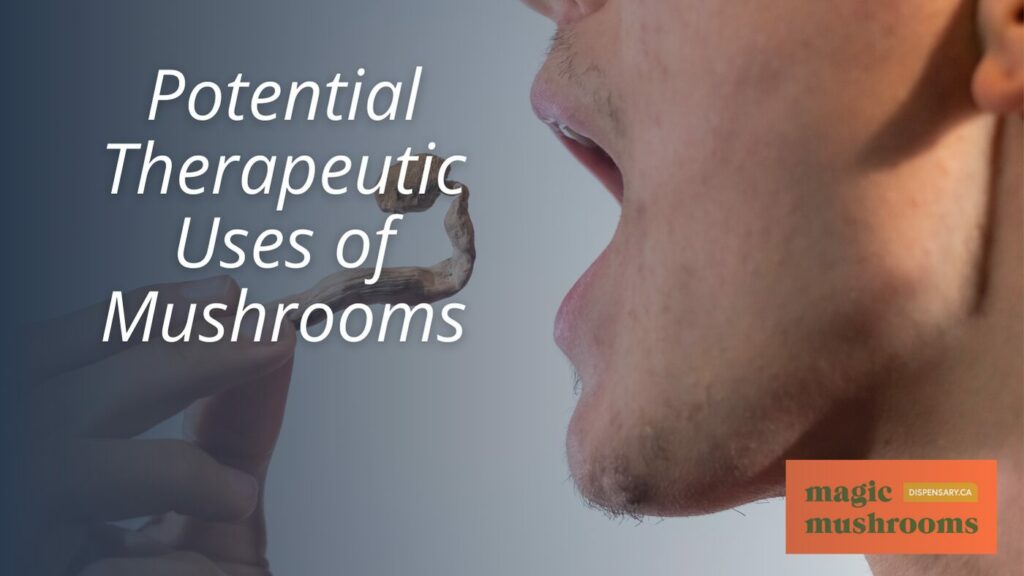
The potential therapeutic uses of mushrooms, particularly psilocybin, are garnering significant attention in the field of mental health due to their promising capabilities in treating conditions such as major depressive disorder, anxiety, PTSD, and addiction. This interest has been sparked by the compound’s profound effect on emotions and brain function, leading to reduced negative affect, increased positive affect, and altered brain responses to emotional stimuli.
The transformative effects of psilocybin are believed to be linked to changes in brain plasticity and connectivity, particularly in areas like the amygdala, prefrontal cortex, and decision-making circuits. The lasting reductions in negative mood and clinical symptoms post-psilocybin administration suggest a potential therapeutic role for this compound in modulating emotional states and brain activity.
For hard-to-treat conditions like major depressive disorder, psilocybin offers a ray of hope. Studies are ongoing to explore further the potential benefits of mushrooms for anxiety, PTSD, and addiction. Through its interaction with serotonin receptors in the brain, psilocybin can impact mood, perception, and emotional empathy, providing a unique approach to treatment.
Clinical trials have begun to demonstrate the safety and efficacy of mushrooms in treating various mental health disorders. Additionally, mushrooms have been recognized for their potential in alleviating end-of-life anxiety and promoting neuroplasticity. As we continue to understand the complexities of the brain and mental health, the therapeutic potential of mushrooms offers a promising avenue toward liberation from debilitating conditions.
Psilocybin in Treating Depression
Building on the potential therapeutic uses of mushrooms, recent research has increasingly focused on the role of psilocybin in treating depression. Psilocybin is the active compound in magic mushrooms and has been found to have significant impacts on emotions and brain function, underpinning its potential as a depression treatment tool. This happens as psilocybin alters brain responses to emotional stimuli, reducing negative and enhancing positive affect.
Research has shown that individuals who received psilocybin treatment experienced long-lasting reductions in clinical symptoms. These reductions have been recorded up to 12 months post-administration, signaling a potential long-term therapeutic benefit for depression sufferers. By targeting adverse effects, psilocybin could be leveraged as a critical player in the fight against depression.
Studies have further highlighted the potential of psilocybin microdosing in improving mood and mental health. This could be particularly beneficial for individuals with depression, as they often struggle with persistent negative mood states. The ability of psilocybin microdosing to uplift mood and enhance mental wellbeing offers a promising avenue for depression treatment.
Evidence also indicates that psilocybin enhances brain network plasticity. This not only helps in reducing depression symptoms but also contributes to a greater understanding of the disease mechanism. By inducing altered brain activity and fostering positive affect acutely, psilocybin provides valuable insights into its potential as a treatment for depression.
Mushrooms and Anxiety Management
Delving into the realm of anxiety management, research suggests that psilocybin, found in mushrooms, has the potential to alleviate anxiety symptoms by inducing changes in brain connectivity and promoting communication between different regions of the brain. This active compound in magic mushrooms has been shown to have profound effects on emotions and brain function.
Studies indicate that psilocybin administration can lead to reduced negative affect and increased positive affect. It can alter brain responses to emotional stimuli, likely linked to brain plasticity and connectivity changes. Critical areas of the brain, such as the amygdala, prefrontal cortex, and decision-making circuits, are particularly affected. The enduring reductions in negative mood and clinical symptoms following psilocybin administration suggest a promising therapeutic role for this compound in modulating emotional states and brain activity.
In controlled settings, psilocybin treatment has been found to induce mystical-type experiences that could potentially help manage anxiety. This transformative experience can foster a profound shift in perspective, often accompanied by feelings of unity, interconnectedness, and transcendence, which can be profoundly therapeutic.
Moreover, psilocybin’s impact on serotonin receptors in the brain may contribute to its effectiveness in managing anxiety symptoms. Serotonin is a neurotransmitter that plays a crucial role in mood regulation. By interacting with this system, psilocybin can potentially alleviate the debilitating symptoms of anxiety.
Research is ongoing to fully understand the therapeutic benefits of psilocybin and other psychedelic substances in treating anxiety disorders. Preliminary findings, however, suggest that these mushrooms may indeed hold the key to a more liberated, anxiety-free existence.
Psilocybin as a PTSD Treatment
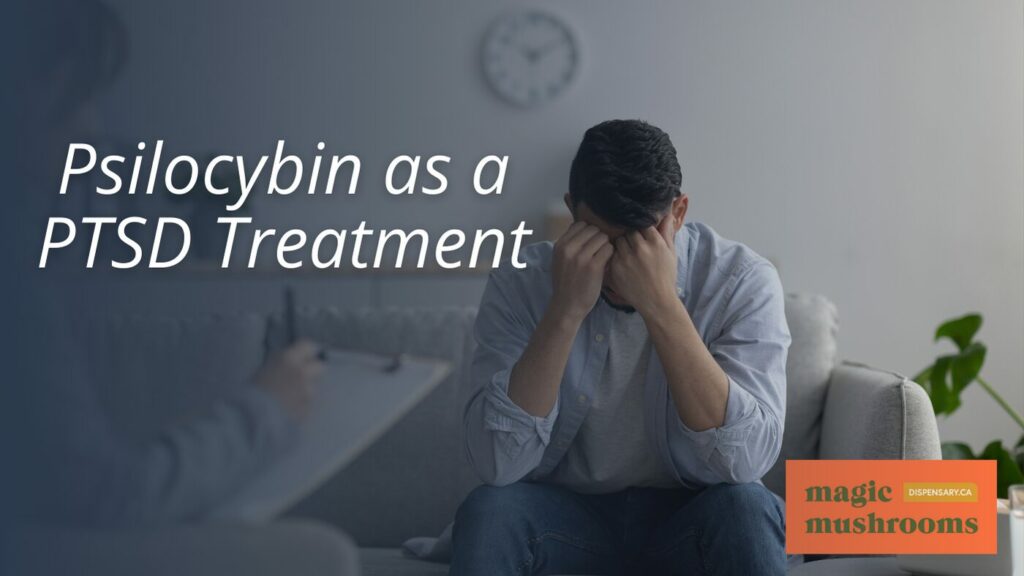
In the realm of post-traumatic stress disorder (PTSD) treatment, psilocybin—known for its profound influence on brain function—has emerged as a viable contender, showing promising results in clinical trials. This naturally occurring compound, found in certain species of mushrooms, has shown the potential to induce lasting changes in individuals who have PTSD.
Psilocybin’s effects on the brain are wide-ranging, influencing areas such as the amygdala, prefrontal cortex, and specific decision-making circuits. These alterations in brain function underpin the reduction in negative affect and increase in positive affect experienced by participants in clinical trials. This suggests that psilocybin may modulate emotional states and brain activity in a manner beneficial for those suffering from PTSD.
Ongoing research is focusing on establishing the safety and effectiveness of psilocybin in PTSD treatment. While the full range of potential side effects is not yet known, the current evidence points to this compound’s potential as a breakthrough treatment for PTSD. Its ability to enhance neuroplasticity—the brain’s capacity to form and reorganize synaptic connections—may open new pathways for addressing trauma-related conditions.
As we continue to explore the vast potential of psilocybin, it is clear that these mushrooms offer much more than a recreational experience. They represent a novel approach to mental health treatment, one that promises liberation from the debilitating effects of PTSD. This new frontier of therapeutic intervention holds substantial promise for those seeking a breakthrough in their journey toward mental health recovery.
The Dangers of Psychedelic Mushrooms
Despite the therapeutic potential of psilocybin, there are considerable risks associated with the use of psychedelic mushrooms, particularly for individuals with pre-existing mental health issues. The use of these substances can, in rare cases, induce psychosis, a severe mental disorder that disconnects a person from reality. This poses a significant risk to those who already struggle with mental health conditions, as the mind-altering effects of the mushrooms can exacerbate symptoms.
Moreover, the consumption of psychedelic mushrooms can disrupt sleep patterns, leading to vivid dreams or nightmares. These disturbances, while temporary, can impact overall wellbeing, affecting both physical health and mental stability. Good sleep is essential to a healthy lifestyle, and any disruption can have far-reaching consequences.
Therefore, individuals need to exercise caution when considering the use of psychedelic mushrooms. While they do hold promise for specific therapeutic applications, the potential detrimental effects on mental health and sleep cannot be overlooked. It is always recommended to seek advice from a healthcare professional before using these substances, especially for individuals with underlying mental health conditions.
Psilocybin Works Differently Than Antidepressants
More and more studies are now being done using magic mushrooms to treat certain conditions like anxiety, addiction, and even depression with some level of success. They’ve also been known to help manage illnesses like cluster headaches.
Neuroscientists are still not sure exactly how psychedelics work. However, MRI imaging has shown that patients’ brains experience reduced blood flow and appear to rest better after taking psilocybin. By contrast, patients suffering from depression and anxiety tend to display abnormally high brain activity.
Patients on psilocybin also undergo a resetting of their brains, where the connections between various regions of their brains break down and reintegrate. This could be the reason why persons treated with psilocybin can overcome compulsive behavior as well as depression.
Dr. Robin Carhart-Harris of the Imperial London College says participants who’ve received psilocybin therapy go through a cathartic emotional release, unlike the effects of antidepressants, which only dull the patients’ emotions. According to him, antidepressants and behavioral therapy, the traditional methods of treating depression, can take several weeks, if not months, to show results and don’t always produce the desired results. Psilocybin encourages patients to face their depression head-on because it works in tandem with our serotonin system to enhance emotional responses.
What Effects Should I Expect From Magic Mushrooms?
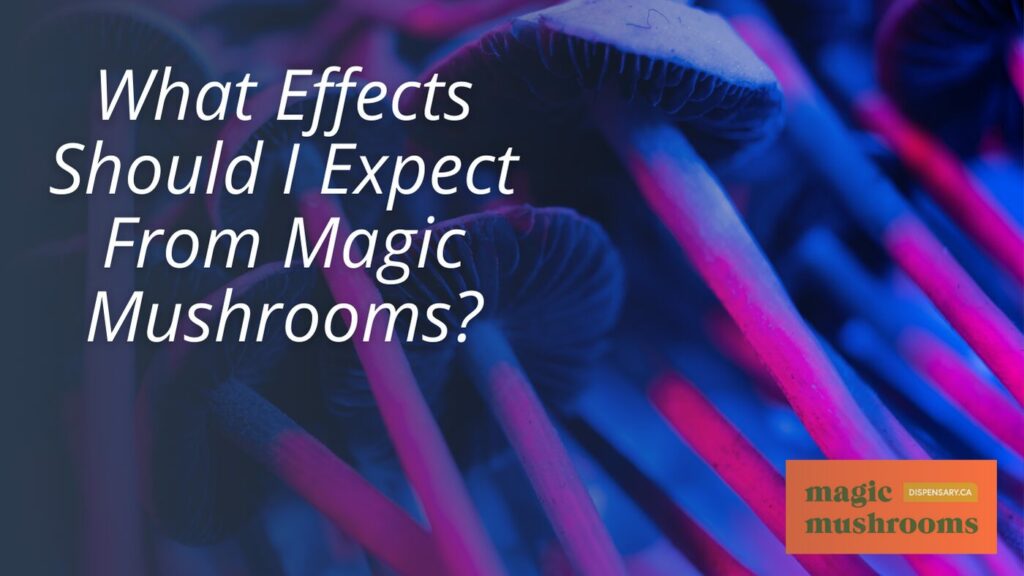
A moderate dose of psilocybin mushrooms (1 to 2.5g) takes you on a trip where your emotional experiences are intensified and your level of introspection is heightened. Your entire psychological functioning is altered as you go through a transient state between being awake and asleep. MRI scans of the brain have shown that a psilocybin trip is pretty much like dreaming.
One hour or so after ingesting psilocybin, you will start to go through changes of perception like illusions, loss of sense of time, and synaesthesia. Visuals will become more enhanced, and you will start seeing halos around lights and objects and sometimes even geometric patterns when you close your eyes.
You’ll feel awed and enchanted by the world around you, but at the same time, you’ll feel connected to it and very much at peace. For some people, changes in how they perceive things can last for several days.
Expect your thoughts and emotions to also undergo some changes. Thoughts and feelings that you keep under the lid in your ordinary life may start to bubble to the surface. Try not to suppress these feelings; instead, let them reach their logical conclusion. People who experience strong negative emotions report also feeling calm and detached afterward.
The Risk of Bad Trips
Navigating the tumultuous waters of a psychedelic mushroom trip can be a complex process, with the ever-present risk of a ‘bad trip’ looming in the shadows. This experience, often characterized by intense fear, anxiety, or paranoia, is a potential hazard for those seeking the liberation that can come with psychedelic exploration.
A ‘bad trip’ is not an uncommon occurrence. While it can be an unsettling experience, it’s essential to understand that it can be managed with the correct preparation, support, and environment. The likelihood of a ‘bad trip’ is greatly influenced by factors such as set and setting, terms that refer to an individual’s mindset, and the physical and social environment in which the mushroom is consumed. Ensuring a calm mindset and a safe, comfortable environment can significantly reduce the risk of a negative experience.
However, it is crucial to take into account personal mental health history. Individuals with underlying mental health conditions or a history of trauma may be more vulnerable to experiencing a distressing trip. An understanding of personal psychological terrain is thus vital for a safer journey.
In the event of a ‘bad trip,’ there are techniques that can assist in navigating the experience. Grounding exercises and deep breathing can help recenter the individual, while reassurance from a supportive ‘trip sitter’ can provide additional comfort.
Addiction and Psychedelic Mushrooms
Exploring the realm of addiction, recent research has illuminated the potential of psychedelic mushrooms, specifically psilocybin, to disrupt addictive patterns and promote neuroplasticity in the brain. Psilocybin’s power to alter brain connectivity and foster neuroplasticity has been increasingly recognized by scientists engaged in addiction research. These transformative effects have shown promise in helping individuals break free from the shackles of addiction.
Psilocybin, the active compound in magic mushrooms, has been observed to induce mystical-type experiences that promote a shift in one’s perspective. This newfound flexibility in thinking, combined with enhanced emotional empathy, openness, and communication, maybe the key to unlocking the door to liberation from addictive patterns. The profound changes in emotional states and brain activity post-psilocybin administration can potentially modulate the grip of addiction, offering a compelling alternative to traditional treatments.
Moreover, the potential of psilocybin treatment in controlled settings cannot be understated. Studies suggest that these treatments can lead to lasting changes in the brain, thereby fostering the ability to overcome addiction. Beyond anecdotal evidence, rigorous scientific research is underway to establish the statistical significance of these outcomes, further validating the therapeutic potential of psychedelic mushrooms in addiction treatment.
As we continue to explore the mysteries of the brain, psilocybin, and other psychedelic substances offer a promising path toward liberation from addiction. While more research is needed, the potential of psychedelic mushrooms to disrupt addiction and promote neuroplasticity is a beacon of hope for those seeking freedom from the chains of addiction.
Legal Implications of Mushroom Use
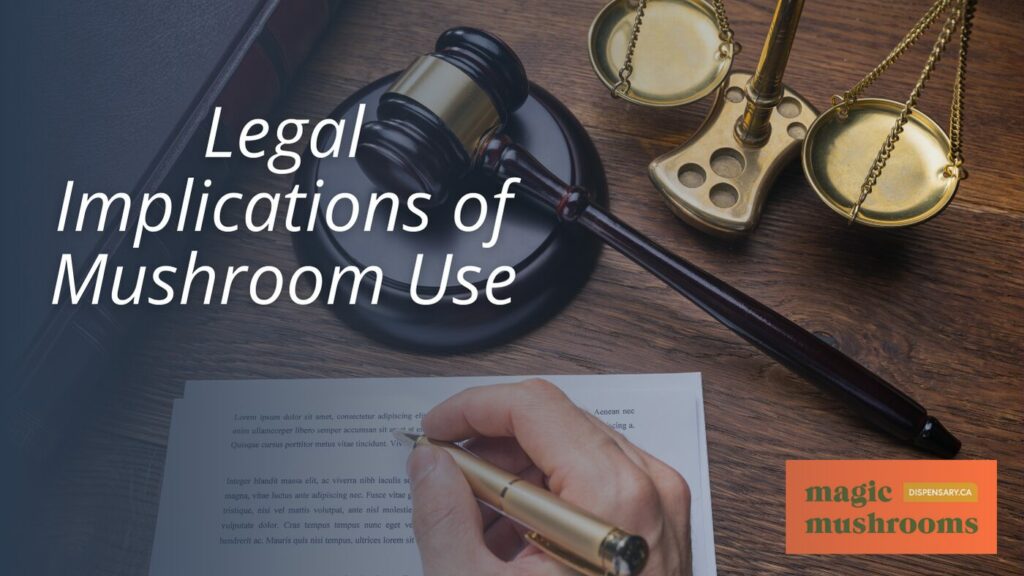
While the potential therapeutic benefits of psychedelic mushrooms are increasingly recognized, it is crucial to understand that their possession, sale, or use remains illegal in many jurisdictions, including the United States. This means that individuals found possessing, selling, or using these substances can face significant legal repercussions, such as criminal charges, hefty fines, or even imprisonment.
However, the legal landscapes surrounding mushroom use are not uniform globally. Some jurisdictions have taken steps toward decriminalization or have reduced penalties for personal use of mushrooms. This shift is primarily rooted in the growing body of research suggesting the potential therapeutic benefits of psilocybin, the active compound in psychedelic mushrooms, particularly for mental health disorders.
In a few cases, controlled environments like clinical trials or research settings may allow the legal use of mushrooms for specific purposes. This access, however, is typically strictly regulated and limited to participants who meet specific criteria. Therefore, there are more viable routes for general access and use.
Given this complex and evolving legal landscape, individuals must understand the laws and regulations in their specific location to avoid any legal consequences of mushroom use. In pursuing cognitive and emotional liberation, it’s important to remember that legal considerations should not be neglected. As we continue to explore the potential of these fascinating fungi, it is our collective responsibility to do so within the confines of our legal systems.
The Controversy Surrounding Psilocybin Use
The use of psilocybin, classified as a Schedule I drug in the United States, is a topic of considerable controversy, stemming primarily from its hallucinogenic effects and potential for misuse. Critics argue that psilocybin’s potent psychoactive properties can lead to unpredictable and dangerous behavior, particularly its capacity to induce profoundly altered perceptions of reality.
Despite the controversy, proponents of psilocybin use point to emerging research indicating potential therapeutic benefits. Studies have shown that psilocybin may profoundly affect emotions and brain function, including the potential to reduce negative affect and increase positive affect. These insights suggest a possible therapeutic role for psilocybin in modulating emotional states and brain activity, particularly in mood regulation and decision-making areas.
However, the potential misuse of psilocybin cannot be ignored. Evidence of potential harm includes instances of acute psychological distress, risky behavior, and the potential for psilocybin to trigger latent psychological conditions.
The controversy surrounding psilocybin use also involves debates about its regulation and accessibility. Some argue for a controlled, therapeutic use model, while others advocate for broader access for both medical and recreational purposes. Balancing these competing viewpoints is a complex task demanding a nuanced understanding of the risks and benefits involved.
Microdosing: Benefits and Risks
Amid the ongoing debate over the use and regulation of psilocybin, the practice of microdosing has emerged, offering potential benefits alongside its own set of risks. Microdosing involves the administration of sub-perceptual doses of psilocybin, which may enhance mood, cognitive function, and mental health without causing the typical hallucinogenic effects associated with higher doses.
Research by scientists such as Federico Cavanna, Stephanie Muller, and Zach Walsh has shown that psilocybin microdosing can significantly improve mood and mental health compared to non-microdosing controls. These beneficial effects were observed even one month after administration, suggesting a lasting impact on emotional wellbeing.
Psilocybin’s potential therapeutic benefits may be linked to its effect on brain plasticity and connectivity. Specific areas of the brain, such as the amygdala, prefrontal cortex, and decision-making circuits, are particularly affected. This alteration in brain responses may result in reduced negative affect and increased positive affect, providing relief for those struggling with mental health disorders.
However, while the benefits of microdosing are promising, it’s essential also to consider the risks. As with any substance, incorrect dosing can lead to unwanted side effects, and the long-term effects of consistent microdosing still need to be fully understood. Furthermore, the lack of regulation around psilocybin use can impact the quality and safety of the substances used for microdosing.
The Future of Psilocybin Research
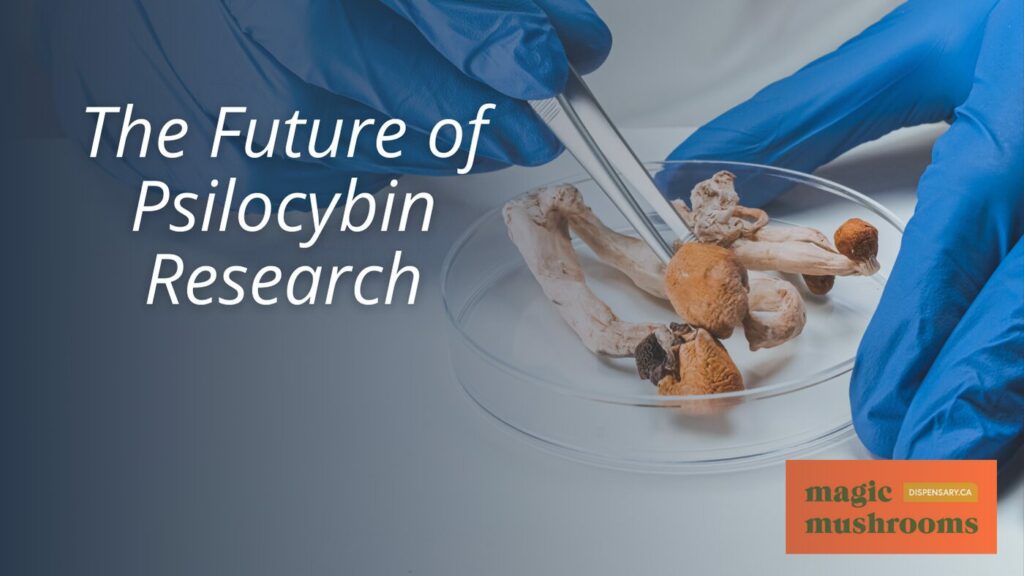
Looking ahead, burgeoning research into psilocybin’s potential therapeutic applications is opening new avenues in neuropsychiatric disorder treatment. The active compound in magic mushrooms, psilocybin, has shown promise in modulating emotional states and brain activity. Studies suggest it can reduce negative affect, enhance positive affect, and alter brain responses to emotional stimuli.
Ongoing clinical trials are exploring the therapeutic potential of psilocybin for several neuropsychiatric disorders. The FDA’s breakthrough therapy designation for psilocybin underlines its medical promise and fuels the momentum in the research community. This designation is a testament to the possibility of psilocybin becoming a significant tool in the arsenal of mental health treatments.
The research is not limited to short-term effects. Scientists are focusing on understanding the longer-term impacts of psilocybin on brain dynamics. They are scrutinizing the connections between altered brain dynamics and users’ subjective experiences. This pioneering research could lead to breakthrough insights into how our brain processes emotions and experiences.
The movement to test psilocybin as a treatment for depression and anxiety is gaining momentum. The growing need for effective therapies for these pervasive disorders drives this. The potential for psilocybin to reshape treatment strategies is exciting, and the future of research in this area promises to be transformative.
Myths and Misconceptions About Mushrooms
Despite the widespread popularity of magic mushrooms, numerous myths and misconceptions about their effects on the brain persist. It is essential to address these fallacies to foster understanding and promote safe, responsible usage.
One prevalent myth is that mushrooms cause permanent brain damage. Current scientific research refutes this, demonstrating no long-term cognitive impairments associated with the responsible use of psilocybin, the active compound in magic mushrooms. Instead, studies indicate that mushrooms can promote neuroplasticity and long-lasting changes in brain connectivity, which may have potential benefits for mental health.
Another common misconception is that magic mushrooms remain in the brain for extended periods. In reality, the effects of psilocybin typically last only between 4 to 6 hours, after which the compound is metabolized and excreted.
The notion that mushrooms lead to addiction is also erroneous. Unlike substances such as opioids or alcohol, mushrooms are not considered physically addictive. They do not induce cravings or withdrawal symptoms, which are hallmarks of addiction.
Personal Experiences: Real Stories
Countless personal anecdotes shed light on the varied experiences individuals have when using psychedelic mushrooms, ranging from enhanced emotional empathy and openness to altered realities vivid with colors and patterns. These personal narratives illuminate the profound shifts in perceptions and emotional states these natural substances can instigate.
Many mushroom users recount a heightened sense of emotional understanding and connectivity, often leading to reflective insights and personal growth. This enhanced emotional empathy is not confined to the self but expands towards others, fostering a sense of universal love and unity. The experience can be life-altering, encouraging a deeper understanding of the self and the world.
Equally prevalent in these narratives are descriptions of altered realities, where everyday objects take on different forms, colors become vivid, and patterns emerge from the mundane. The walls breathe, the stars twirl and music takes on a new depth. This altered perception of reality provides users with a fresh perspective and a new lens through which to view the world.
However, it is paramount to note that not all experiences are positive. Some individuals encounter challenging emotions, and the journey can be difficult. The effects vary significantly based on dosage, mindset, and environmental setting. Consequently, caution and responsible use are crucial to mitigating risks.
These personal stories underline the transformative potential of psychedelic mushrooms while also highlighting the importance of using them in a mindful and controlled manner. They serve as reminders that these substances are not merely recreational tools but can be gateways to profound personal insight and growth.
Frequently Asked Questions
How Do Magic Mushrooms Interact With Other Medications or Substances?
Magic mushrooms, containing the active compound psilocybin, can interact with other substances or medications, potentially altering their effects. The interactions largely depend on the specific substance or medication in question. For example, combining psilocybin with antidepressants may intensify the effects of both, while use with alcohol or other sedatives can lead to increased sedation. It’s essential to consult a healthcare provider before mixing substances to avoid adverse effects.
Can Psilocybin Use Affect Pregnancy or Breastfeeding?
Definitive research is scarce on psilocybin’s effects on pregnancy or breastfeeding. However, as the adage goes, “Better safe than sorry.” Considering the potential risks, it is advised that pregnant or breastfeeding individuals abstain from psilocybin use. The substance could potentially cross the placental barrier or be transmitted through breast milk, which might pose risks to the developing fetus or infant. A healthcare professional’s counsel should always be sought before making such decisions.
What Is the History and Origin of Psychedelic Mushroom Use?
Psychedelic mushroom use traces back to prehistoric times, with archaeological evidence of their consumption in religious and healing rituals. These mushrooms, especially ‘Psilocybe’ species, were prominent in Mesoamerican cultures, such as the Aztecs and Mayans. Their use declined with Christianization in the 16th century but experienced a resurgence in the 20th century. They are recognized for their potential therapeutic benefits in mental health treatment.
Are There Different Strains of Psychedelic Mushrooms With Varying Effects?
Indeed, there are various strains of psychedelic mushrooms, each with distinct effects. These differences are primarily due to variations in psilocybin and psilocin concentrations. Strains such as Psilocybe cubensis are known for their robust effects, while Panaeolus cyanescens offers a more subtle experience. Depending on the strain and dosage, the varied effects can range from altered perception and euphoria to profound existential insights. It’s crucial to know your strain for a safe and enlightening experience.
What Role Does Individual Biology Play in the Effects of Psilocybin?
Individual biology plays a significant role in the effects of psilocybin. Genetic makeup, brain structure, and personal health can influence one’s response to the compound. For instance, genetic factors may affect the rate at which psilocybin is metabolized, while differences in brain structure can impact how the substance interacts with various neural pathways. Furthermore, an individual’s physical and mental health status can also influence their reaction to psilocybin.
Conclusion
In conclusion, when discussing what mushrooms do to your brain, it’s important to note that psilocybin, the active ingredient in magic mushrooms, significantly alters brain activity and emotional responses. Your brain on mushrooms experiences notable changes, as evident in a study that found 80% of participants reported enhanced wellbeing or life satisfaction following a single dose of psilocybin. This points to the potential of psilocybin in the field of mental health, particularly in improving emotional regulation and reducing negative mood states. Ongoing research is crucial to fully understanding mushrooms’ therapeutic potential and risks.
Buying Microdosing Mushrooms Online in Canada
Are you an avid microdoser or looking to venture into the art of microdosing? Working with a reliable, trustworthy shrooms dispensary is paramount in your journey of becoming a better version of yourself. Magic Mushroom Dispensary prides itself on its comprehensive collection of top-notch microdosing products, psilocybin books, excellent customer service, and fast, discreet shipping. Visit our online shop today and enjoy low prices and free shipping for orders above $99.
Originally posted on April 24, 2024 @ 11:43 am
